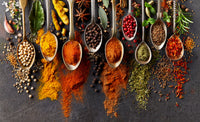Herbs and spices have been used for both culinary and medical reasons for millennia. Spices can prevent both acute and chronic illnesses in addition to improving the flavor, fragrance, and color of food and beverages.
More Americans are thinking about using spices and herbs as medicines and treatments, particularly for a variety of chronic diseases. There is now plenty of proof that spices and herbs have cognitive- and mood-affecting characteristics in addition to antioxidant, anti-inflammatory, antitumorigenic, and cholesterol- and glucose-lowering capabilities.
Through its bioactive components, such as sulfur-containing compounds, tannins, alkaloids, phenolic diterpenes, and vitamins, notably flavonoids and polyphenols, research over the past ten years has shown a wide variety of health qualities.
Due to their high phenolic component concentration, spices and herbs including cinnamon, clove, rosemary, sage, and oregano provide great sources of antioxidants.
It is clear that regularly eating spicy meals was also associated with a decreased risk of mortality from cancer, ischemic heart disease, and respiratory illnesses.
The exact function of spices and herbs in preserving health, particularly in preventing the emergence of chronic, noncommunicable illnesses, is currently unknown.
This study emphasizes the possible health advantages of certain frequently used herbs and spices, including garlic, rosemary, fenugreek, black pepper, turmeric, and chili pepper.




